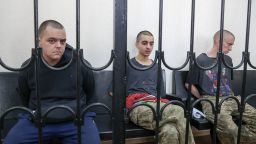Ukraine’s southern city of Mariupol, now fully under Russian control, is at risk of a cholera outbreak, according to a British intelligence report published Friday, echoing concerns of Ukrainian officials as Russia struggles to provide basic public services to civilian populations in areas it has occupied.
The report said that access to drinking water, internet connection and phone services remain inconsistent in Russian-occupied areas of Ukraine.
The occupied city of Kherson “likely faces a critical shortage of medicines,” while the port city of Mariupol “is at risk of a major cholera outbreak,” the report says, adding that “isolated cases of cholera have been reported since May.”
Petro Andrushenko, an adviser to the elected Ukrainian mayor of Mariupol, warned on Tuesday of an increasingly dire situation in that city, which was “being quietly closed” by Russia due to the potential cholera outbreak amid deteriorating sanitary conditions.
“The occupiers seem to have realized that there is such a challenge,” Andrushchenko said on national television. “There are talks about quarantine. The city is being quietly closed.”
Andrushchenko, who is not in the city but has been a reliable conduit of information from Mariupol, said that it was “difficult to convey” the bleak conditons of the once-thriving vacation spot by the Sea of Azov.
“The city has really turned into one with corpses everywhere,” he said. “They are piled. The occupiers cannot cope with burying them even in mass graves. There is not enough capacity even for this.”
CNN cannot independently confirm Andrushchenko’s claims.
Cholera is an acute diarrheal illness that kills thousands of people worldwide each year. It is easily transmitted, by consuming food or water contaminated with the fecal bacteria Vibrio cholerae.
’ A huge hazard’
The World Health Organization (WHO) has also expressed concerns about cholera in the city, saying it received “information that there are swamps actually in the streets, and the sewage water and drinking water are getting mixed,” Dr. Dorit Nitzan, the emergencies coordinator for WHO’s European region, said on May 17 in Kyiv.
During Nitzan’s visit to Ukraine last month, she decribed Mariupol’s hygienic situation as a “a huge hazard.”
Andrushchenko said natural water sources in the city are decreasing as the warmer months arrive. He said Russian evacuations from the city had stopped, and that leaving the city is no longer possible.
“You can enter the city with a residence permit in Mariupol. But this is a one-way ticket, because you cannot leave.
“Of all the possible scenarios to fight the epidemic, in our opinion, Russia has chosen, as always, the most cynical one – just to close the people in the city and leave everything as it is: Whoever survives, survives,” he said.
The deputy mayor of Mariupol, Serhiy Orlov, who is also not in the city, said Tuesday that he believes around 150,000 people remain out of a pre-invasion population of more than 400,000, and a further 30,000 to 40,000 in surrounding suburbs.
Orlov claimed that Russian had taken large amounts of medical equipment from Mariupol to the separatist city of Donetsk.
Mariupol has witnessed some of the heaviest fighting of the invasion. It was there that Russia carried out deadly strikes on a maternity ward and the bombing of a theater. Before falling under Russian control, the city was a symbol of Ukrainian resistance as it sustained relentless attacks.
Conditions deterioriated rapidly over the course of the war, with food and water dwindling in the city. The battle for the city ended in May when Russian forces ended the final holdout of Ukrainian resistance in the Azovstal steel plant.
Ukraine last suffered a major cholera epidemic in 1995 and has experienced minor outbreaks since, “especially around the Azov sea coast – which includes Mariupol,” according to the British intelligence report. “Medical services in Mariupol are likely already near collapse: a major cholera outbreak in Mariupol will exacerbate this further.”
Teele Rebane and Irene Nasser contributed to the report.



